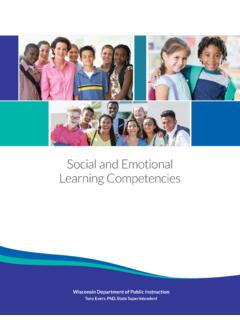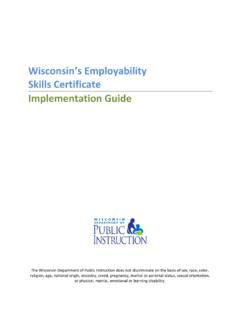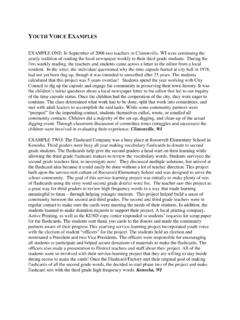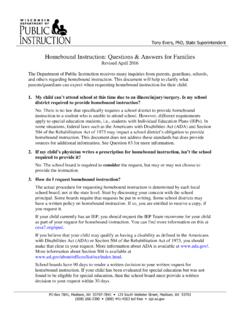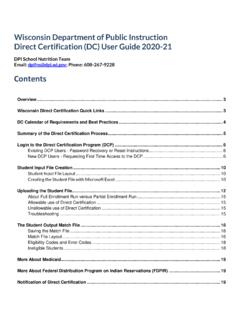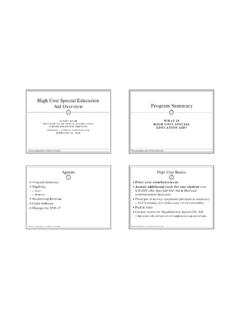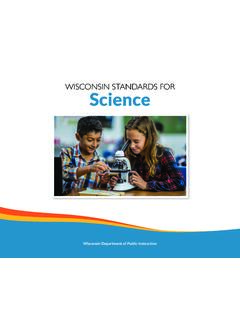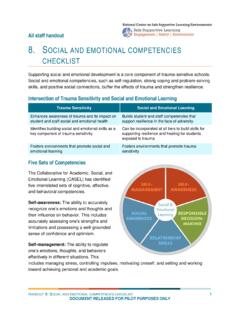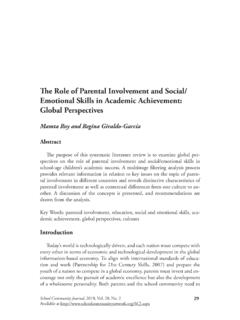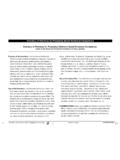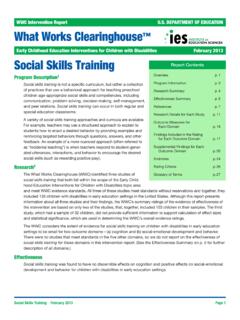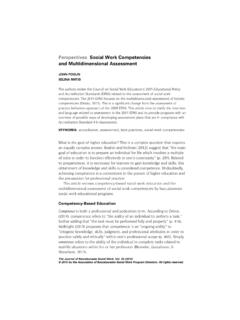Transcription of SOCIAL EMOTIONAL LEARNING
1 SOCIAL - EMOTIONAL LEARNINGPANORAMA EDUCATION November 2015 USER GUIDE2 ABOUT SOCIAL - EMOTIONAL LEARNINGO verview SOCIAL - EMOTIONAL LEARNING (SEL) describes the mindsets, skills, attitudes, and feelings that help students succeed in school, career, and life, such as as growth mindset, grit, and sense of belonging at school. Educators use many names for these skills, such as non-cognitive skills , soft skills , 21st century skills , character strengths, and whole child. SOCIAL - EMOTIONAL LEARNING is an important part of a well-rounded education. Research shows that SEL is an important lever for boosting academic achievement. Positive SOCIAL - EMOTIONAL skills are also correlated with improved attendance and reduced disciplinary incidents. When looking at SEL in a school setting, we encourage schools to focus measurement and improvement efforts on three general areas: student competencies (or skills), student supports and environment, and teacher skills and perspectives: competencies involves the SOCIAL , EMOTIONAL , and motivational skills that help students succeed at school, in their careers, and in life.
2 Examples of student competencies include Grit and Growth Mindset. supports and environment involves the environment in which students are LEARNING , which influences their academic success, their SOCIAL - EMOTIONAL development, and their growth as human beings. Measures of student supports and the school environment include Teacher-Student Relationships, Sense of Belonging (at school), and School Safety. skills and perspectives captures teachers readiness and preparation to support SEL on campus. This area looks at whether teachers feel that they have the skills, knowledge, and resources to support students SOCIAL - EMOTIONAL outcomes. Examples of these measures include: Professional LEARNING About SEL and School Climate. Within each of the three broad areas, Panorama offers a set of measures, each focused on a particular sub-topic. Schools can choose to use the measures that are most appropriate for their community, and match their school or district SEL framework, while retaining the validity of each measure.
3 We hope these SEL measures help your school, network or district to understand and support student development in these critically important areas. 3 Who should use Panorama s SEL measures? Panorama s SEL measures are designed help educators understand students SOCIAL - EMOTIONAL competencies and their perceptions of how supported they are in their school environment. The questions and prompts are created to be broadly applicable and can be used in many types of school settings, including public, independent, and charter schools. These SEL measures are appropriate for school communities serving students from a range of socio-economic backgrounds. Questions and prompts are designed for two separate groups: students in grades 3-5 and students in grades 6-12. There are also optional questions for teachers of these students. Research Process These SEL measures have been used in thousands of schools across the United States and are regularly checked for validity and reliability.
4 Many schools and districts have found positive correlations between these SEL measures and important student outcomes, including GPA, test scores, and attendance. Many of the SEL measures were created by Dr. Hunter Gehlbach, Associate Professor at the Gevirtz Graduate School of Education at the University of California, Santa Barbara (UCSB) and Director of Research at Panorama Education. Some measures have been adapted from work developed by the CORE Districts, Transforming Education, and their research partners, as well as work developed at Harvard University by Dr. Hunter Gehlbach and his research team at the Harvard Graduate School of Education. We are grateful for the support and contributions of our partners. Using the Measures To meet the needs of your school communities, we encourage you to choose which SEL measures to use by selecting the scales that seem most important in your community. The scales are grouped into three categories: student competencies , student supports and environment, and teacher skills and perspectives.
5 Within categories, we have also divided the scales into recommended and supplemental scales, as an indication of which scales many of our partners have chosen to measure. At Panorama, we believe that all educators deserve access to the best tools available, which means that we are committed to offering Panorama s SEL measures for free. The measures are free in that we invite educators everywhere to use them at no cost. We only ask that you identify the measures as Panorama Education SOCIAL - EMOTIONAL LEARNING Measures so that others may find them as well. If you have any feedback about the measures, contact us at IT MEASURESS tudent competencies The SOCIAL , EMOTIONAL , and motivational skills that help students succeed at school, in their careers, and in life. Grit Recommended p. 8 How well students are able to persevere through setbacks to achieve important long-term goals. Example Question: How often do you stay focused on the same goal for several months at a time?
6 Growth Mindset Recommended p. 9-10 Student perceptions of whether they have the potential to change those factors that are central to their performance in school. Example Question: In school, how possible is it for you to easily you give up? Self-Management Recommended p. 11-12 How well students manage their emotions, thoughts, and behaviors in different situations. Example Question: During the past 30 often did you come to class prepared? SOCIAL Awareness Recommended p. 13-14 How well students consider the perspectives of others and empathize with them. Example Question: During the past 30 carefully did you listen to other people s points of view? Self-Efficacy Recommended p. 15 How much students believe they can succeed in achieving academic outcomes. Example Question: When complicated ideas are presented in class, how confident are you that you can understand them? LEARNING Strategies Supplemental p.
7 16 How well students deliberately use strategies to manage their own LEARNING processes generally. Example Question: How often do you use strategies to learn more effectively? Classroom Effort Supplemental p. 17 How much effort students put into school and LEARNING . Example Question: How much effort do you put into your homework for this class?45 SOCIAL Perspective-Taking Supplemental p. 18 The extent to which students consider the perspectives of their teachers. Only for students in grades 6-12. Example Question: How much effort have you put into figuring out what your teachers' goals are? Self-Efficacy About Specific Subjects Supplemental p. 19 How much students believe they can succeed in achieving academic outcomes in specific subjects. Example Question: How confident are you that you can learn all the material presented in your [SUBJECT] class? Emotion Regulation Supplemental p. 20 How well students regulate their emotions.
8 Example Question: How often are you able to control your emotions when you need to? Background Questions Recommended p. 33 Demographic questions about respondents that could be included and may be of interest to many schools. Example Question: What is your race or ethnicity? 6 Student Supports and Environment The extent to which the environment in which students are LEARNING influences their academic success, their SOCIAL - EMOTIONAL development, and their growth. Teacher-Student Relationships Recommended p. 21 How strong the SOCIAL connection is between teachers and students within and beyond the school. Example Question: How many of your teachers are respectful towards you? Sense of Belonging Recommended p. 22 How much students feel that they are valued members of the school community. Example Question: How connected do you feel to the adults at your school? School Safety Recommended p. 23 Perceptions of student physical and psychological safety while at school.
9 Example Question: How often do you worry about violence at your school? Engagement Supplemental p. 24 How attentive and invested students are in school. Example Question: In your classes, how eager are you to participate? Rigorous Expectations Supplemental p. 25 How much students feel that their teachers hold them to high expectations around effort, understanding, persistence, and performance in class. Example Question: How often do your teachers take time to make sure you understand the material? Valuing of Specific Subjects Supplemental p. 26 How much students feel that an academic subject is interesting, important, and useful. Example Question: How often do you use ideas from [SUBJECT] class in your daily life? Valuing of School Supplemental p. 27 How much students feel that school is interesting, important, and useful. Example Question: How important is it to you to do well in your classes?7 Teacher Skills and Perceptions The readiness and preparation of teachers to support SEL on campus.
10 Teacher Self-Reflection Recommended p. 28 Faculty perceptions of their professional strengths and areas for growth related to SOCIAL - EMOTIONAL LEARNING . Example Question: How confident are you that you can engage students who typically are not motivated? Professional LEARNING About SEL Recommended p. 29 Perceptions of the amount and quality of professional growth and LEARNING opportunities available to faculty related to SOCIAL - EMOTIONAL LEARNING . Example Question: At your school, how valuable are the SOCIAL - EMOTIONAL LEARNING (SEL) professional development opportunities? School Climate Recommended p. 30 Perceptions of the overall SOCIAL and LEARNING climate of the school. Example Question: How positive are the attitudes of your colleagues? Resources for Student Support Recommended p. 31 Perceptions of the adequacy of the school s resources for student support. Example Question: When students need help from an adult, how often do they have to wait to get that help?
